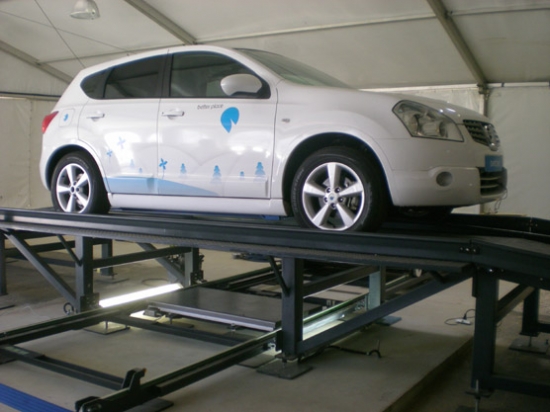
Robotic battery change station. The empty battery is removed from under the car and replaced with a full battery in less than one minute. Photo courtesy of Rosalyn Futeran
Cleaner air, a quieter environment, a cheaper source of energy…are just some of the assets of electric cars creating a global revolution.
The electric car has certainly captured everyone’s attention, and it seems that we all want to drive one. Hybrids with two sources of power have been around for some time now, but a purely electric vehicle is something quite different. Perhaps driven by concern for the environment, nearly all of the world’s car manufacturers are building electric vehicles and this is a subject we clearly want to know more about after using oil-based cars for a century. So has there been some sort of technological breakthrough which could justify the changeover from gasoline to battery power – to the car without an exhaust pipe? The answer is a ringing “no” – if you discount the lithium ion batteries – the same type that you use in your cell phone – as a breakthrough. These batteries are much smaller and lighter than the old lead acid batteries and contain no liquid, and of course, intensive research is ongoing to make them ever more efficient.
What seems to have stimulated the market in Israel is a powerful business model exemplified by Better Place led by Mr Shai Agassi. He has managed to sell the idea that as most people – at least 80% - drive their cars for less than 150 kilometers per day – the car battery will have enough charge to get them home safely where they can plug it in to their electricity supply for a recharge during the night. Charging stations are also being built at the curbside and at places of work to supplement the night-time charge and eliminate range anxiety. Swipe your rechargeable credit card on the post and away you go. Driving for a longer distance calls for the battery to be changed, and this requires many stations to be built where this can be done – the battery will drop out from under the car under robot control, and be replaced by a fully charged one in less than one minute. Your car will have a highly sophisticated GPS two-way communications system linked with central control which will automatically track the car and advise when battery power is running low and where the nearest change stations are located.
Clearly, a large investment in infrastructure is required. That technology has been sold in at least half a dozen countries around the world and will be implemented in 2011 as the cars and roadside plugs and battery change stations are built. It is a revolution indeed. The advantage of course is cleaner air for us all, a quieter environment and a cheaper source of energy from power stations which can utilize renewable and sustainable clean bio-fuels, nuclear, wind, solar and wave energy and be able to shed the load mainly at night, just at the time when industry is quiet and electricity cheaper. It is easier to build a pollution control system into centralized power stations than into vehicles. It sounds like a good bet, and we will watch to see how successfully the technology will be accepted by the many fleet owners who have signed up.
So would you invest in one of these cars? The most likely deal is that you will buy or lease your car but the battery will not belong to you. This is perhaps fortunate as they are very expensive, and one will not want to be buying one just when you want to sell the car. The charges for leasing batteries and for charging have not yet been determined and neither have the prices for the cars even though they are technically much simpler than gasoline powered cars. The car itself looks like a normal car in every way except for that space where the exhaust pipe used to be. There is said to be a very large electric motor under the bonnet which provides stunning acceleration and also the means to produce and store electricity from regenerative braking.
The new technology is likely to have a dramatic effect on the global economy as well as many national economies. A reduction in oil consumption is sure to benefit those countries which have oil importing trade deficits and lower their dependence on a handful of petroleum-rich nations. At the same time there will be the global effect of reduced toxic emissions and a reduction of greenhouse gases which lead to climate change and a cleaner, healthier and more sustainable environment.
The research and development have been done in Israel since 2008 while the parent company of Better Place is situated in Palo Alto in California. Renault are bringing out an electric vehicle called the Fluence. Nissan has its Leaf, Ford will enter the market with an all electric Focus and General Motors will soon be selling its Volt and Mitsubishi its Mie. Electric vehicles, especially trains, have been around for a long time, but now it finally looks as if the car is about to join them.
To put the Israeli situation into a world perspective, there are other initiatives in most countries to encourage electric vehicle usage. Governments in many developed countries are spending large sums to initiate research and development. They have significantly reduced taxes and insurance on electric vehicles, allowed free parking and charging points and access to congestion zones, the use of bus lanes and free toll travel on highways. All the major car manufacturers are rolling out their own versions of electric vehicles and will soon go into mass production mode with them. There are other technological advances which are being investigated such as the hydrogen fuel cell, and while a moderate number of cars and buses can be found on the road with them, mass production is unlikely for many years. Many governments are encouraging mass electric public transit efficiency especially by the very energy efficient tramcar which appears to be a popular form of transportation wherever it has been introduced.
Electric vehicles first came into existence in the mid-19th century, but soon gave way to gasoline cars with an internal combustion engine. It looks as if the clock is now going to be turned back once more due to widespread concerns over the environmental impact, improved battery, electrical and electronic technology and electric power production from fossil free and renewable sources of energy. We are entering a new world.
 DEAR EDITOR 157 MAGAZINE
DEAR EDITOR 157 MAGAZINE COUNTING ON INFERENCE
COUNTING ON INFERENCE SHULAMIT LAMIE RAVINSKY 1925-2010
SHULAMIT LAMIE RAVINSKY 1925-2010 From Australia with Love
From Australia with Love Monkey Tales
Monkey Tales A fresh spirit of Zionism from Manhattan
A fresh spirit of Zionism from Manhattan Michael Adler
Michael Adler